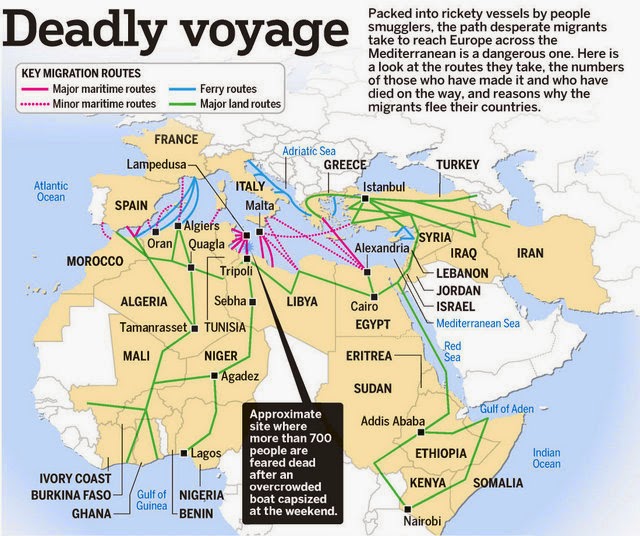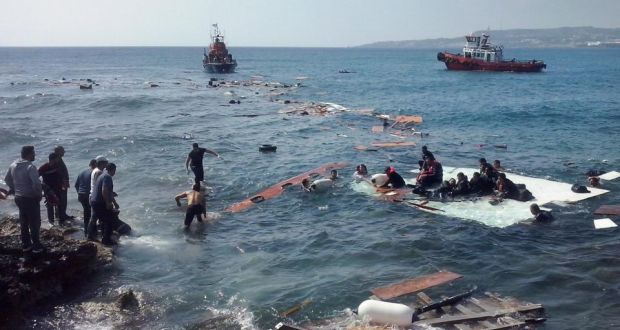IASbaba's Daily Current Affairs Analysis, IASbaba's Daily Current Affairs September 2015, National, UPSC
Archives
IASbaba’s Daily Current Affairs- 8th September, 2015
INTERNATIONAL
European Migrant Crisis: The Humanitarian Crisis that has made the world awkward
- European Migrants or Refugee Crisis is the greatest crisis since the Second World War. Europe is now in midst of an unprecedented human migration from war inflicted and volatile counties.

Who is a Refugee?
- According to Geneva Convention on Refugees, a refugee is a person who is outside his country of citizens because of their well founded ground of fear of persecution because of their race, religion ,nationality , membership of social group or having particular political opinion, and unable to have sanctuary from the state.
Who are European Refugees?
- European Refugees or Migrants Crisis arose through the rising number of refugees and economic migrants who are fling to the Schegan Area of a European Union across the Mediterranean Sea and South East Europe, from areas such as the Middle East, South East, Africa and Balkans.
- Most of them want to settle France, Germany, Sweden and United Kingdom.
- Majority of the refugees are from Afghanistan, Syria and Eritrea. The crisis has posed question on the Humanitarian Responsibility of the European Countries as well as Ethical Responsibility of the developed Countries like USA.
- This Crisis can be considered as Humanitarian Crisis as It has also put a question mark on the commitment of collective or Shared Responsibility of European Union to maintain social, economic and political stability.

Push and Pull factors of the influx of refugees
- Arab Spring also helped lead to Syria’s war, and to conflict in Yemen, and eventually to the rise of ISIS in Syria and Iraq. Of course none of this caused the exodus of refugees from, say, Afghanistan or Myanmar, but the Arab Spring was perhaps the largest single spark of the ongoing, global refugee crisis.
- Civil Unrest and Violence: Syrian civil war is a big source of the crisis facing Europe. The conflict has killed more than 250,000 people and displaced more than 8m in over four years. Most of the refugees have fled to neighboring countries but are now, increasingly, desperate to reach European shores.
- Political and sectarian repression in other countries has contributed as well. Many families in Eritrea, for example, are fleeing the dictatorship there that is sometimes called Africa’s own North Korea. In Myanmar, the a Muslim minority group known as the Rohingya has endured brutal violence and ethnic cleansing, sometimes with the tacit support of the Myanmar government or even at the hands of government forces themselves.
- Overlapping web of wars and crises that has forced millions of people from their homes in the Middle East, sub-Saharan Africa, and elsewhere and that has opened, ever-so-slightly, a previously closed route to Europe. Bashar al-Assad’s regime has targeted civilians ruthlessly, including with chemical weapons and barrel bombs; ISIS has subjected Syrians to murder, torture, crucifixion, sexual slavery, and other appalling atrocities; and other groups such as Jabhat al-Nusra have tortured and killed Syrians as well.
- Underdeveloped economic conditions of the people in Syria, Afghanistan has also contributed to the migration of the people to European nations with the hope of better future.
- Some argues that denudation in agricultural productivity has threatened the people to migrat There is evidence that the 2007?2010 drought contributed to the conflict in Syria. It was the worst drought in the instrumental record, causing widespread crop failure and a mass migration of farming families to urban centers.
- The pull factor like hope for better conditions of life with peace and prosperity, better educational incentives of the children, safety and security of lives and so on contributed to the migration process.
The World and the Crisis
- The European Union isn’t functioning well in the rehabilitation of the migrants. EU is supposed to handle the crisis collectively. But in practice, most EU countries are reluctant to take the responsibility. This is what we can refer as Responsibility Crisis of the Responsible Union.
- Within Europe, countries are also trying to restrict refugees from getting to or staying within their borders.
- Dublin Regulation of EU : It requires refugees to stay in the first European Country they arrive in until their asylum claims are processed. The rule is to prevent applicants from orbiting the EU Countries. But the EU is acting in illegitimate manner even in the implementation of this regulation too.
Challenges before European Union:
- Euro zone Crisis and recent Greece debt Crisis: EU is crippling with financial crisis followed by Euro zone crisis and recent Greece Default. Therefore it is argued by the Union that they have low economic growth as well as unemployment.
- Infiltration of smuggler and terrorist(extremist) There is also growing apprehension upon the acceptance of the refugees as it has the very potential of infiltration of the smugglers and Extremists.
- Extraordinary investment in infrastructure and personnel recruitment is also another reason for the reluctance of EU to accept the refugees.
- No Common Political consensus: EU do not have any clear immigration policy which has led to no common consensus on the immigration process. Germany has decided to rehabilitate the refugees whereas others are still reluctant due to domestic political atmosphere.
- Anti immigration populism in western countries is another challenge for the governments of European Countries to balance their acts on the rehabilitation of the refugees.
- Threat to national identity and deep sense of insecurity in drastic demographic change in the population structure of the country is also a factor that usually keeps the concerned government to act tactfully with the immigration process.
IASbabas view (Way forward):
- EU countries should share the responsibility proportionately in dealing and resettlement of the immigrants.
- Anti immigration politics must be checked by the International bodies.
- Political leadership and political will is immensely needed which can only be generated by the world public opinion. Therefore the role of Medias, NGOs like Amnesty International have to be super active in this regard.
- Rather than discouraging the immigrants from inflowing. The systematic allowance and strict superintendence and inspection of the immigrants are essential for the proper maintenance of the immigrants.
- Reform the 1951 Refugee Convention is strongly needed, so that all those fleeing civil war, state collapse and murderous militias will get the same protection as those fleeing a well-founded fear of persecution.
- If governments won’t help refugees escape Syria, smugglers and human traffickers will, and the deadly toll will rise.
- It demands a global response to tackle with the problem. Global fund should be raised for the rehabilitation of those refugees.
Connecting dots:
- The problem of European crisis migration of refugees is not actually European. Critically discuss.
- Do you think ethical and humanitarian need is more important than national interest? Critically discuss in the context of recent European Migration Crisis.
NATIONAL
FCRA and Greenpeace Controversy
NGO is Non-Governmental organization; it is set up by individual or groups. NGO may be funded by government, corporates, individuals etc.
Role of NGO in development: Campaigns of NGO helps in creation of awareness among masses; it offers work at grass root level and can take up variety of issues that are clogs in the wheel of development.
Merits in functioning of NGO:
- Responsibility Sharing: They may share responsibility in addition to the government’s development effort
- Development: They can help in development by organizing the campaigns
- Awareness: They can help by selectively creating awareness among the masses
- Stage is set: They can work effectively at grass root level, and understand the problem well and carry on the development efficiently
- Take up Agenda: NGO can take up the development agenda in developing nations and can serve the nation and its people
- Wide diversity: NGO can take up variety of issues like climate change, child labor, human rights, alleviate poverty etc.
- Direct Interaction: They can directly interact with local communities and understand the issue well and help in addressing the micro nature of problem.
Demerits in functioning of NGO:
- Transparency is an issue: Many a times, it is observed that NGO lacks transparency
- Non-disclosure of real motives: They may not disclose the information and carry on with the secret work or jobs
- Lacks Accounting Skill: Some of them do not maintain accounts properly and evade taxes
- Tax Evasion: Some of the NGOs are not registered and still making profits and eventually they also do not pay taxes
About FCRA:
- Foreign Contribution Regulation Act (1976 and 2010), this aims at regulating the donations made from foreign sources.
- Foreign Contribution means the form of donation, transfer or delivery made by a foreign source in term of currency or any other security.
- NGO and NPO come in the purview of FCRA, and it becomes necessary for an NGO or NPO to register or obtain the prior permission of government before receiving foreign grants or donations.
About Greenpeace:
- Greenpeace is non-governmental environmental organization. Its main aim is to ensure that Earth is able to nurture life in all form of diversity. It campaigns to create awareness on issues like commercial whaling, climate change, overfishing, deforestation, genetic engineering etc.
- It does not accept funding from government, corporates or political parties. Instead, it accepts foundation grants and support from individuals.
Greenpeace defines its mission as the following:
Greenpeace is an independent global campaigning organization that acts to change attitudes and behavior, to protect and conserve the environment and to promote peace by:
- Catalysing an energy revolution to address the number one threat facing our planet: climate change.
- Defending our oceans by challenging wasteful and destructive fishing, and creating a global network of marine reserves.
- Protecting the world’s remaining ancient forestswhich are depended on by many animals, plants and people.
- Working for disarmament and peace by reducing dependence on finite resources and calling for the elimination of all nuclear weapons.
- Creating a toxin free future with safer alternatives to hazardous chemicals in today’s products and manufacturing.
- Campaigning for sustainable agricultureby encouraging socially and ecologically responsible farming practices.
Why Greenpeace India in trouble?
- 2014: Indian Intelligence Bureau in interim report to PMO accused Greenpeace India of hurting the economic progress by campaigning against power projects, GM crops and mining.
- 2015: Bank accounts were blocked by Ministry of Home Affair due to non-disclosure of income in banks to tax authorities.
- Government cancels Greenpeace license for FCRA, this implies that Greenpeace will not be able to receive foreign donation.
Connecting the dots:
- Is the government decision to restrict activities of Green peace India a violation of freedom of speech and expression. Evaluate in light of recent developments.
- Examine the role of NGOs in development process. What should be correct course of action to keep a check on NGOs in order to ensure that there is no conflict of interests.














